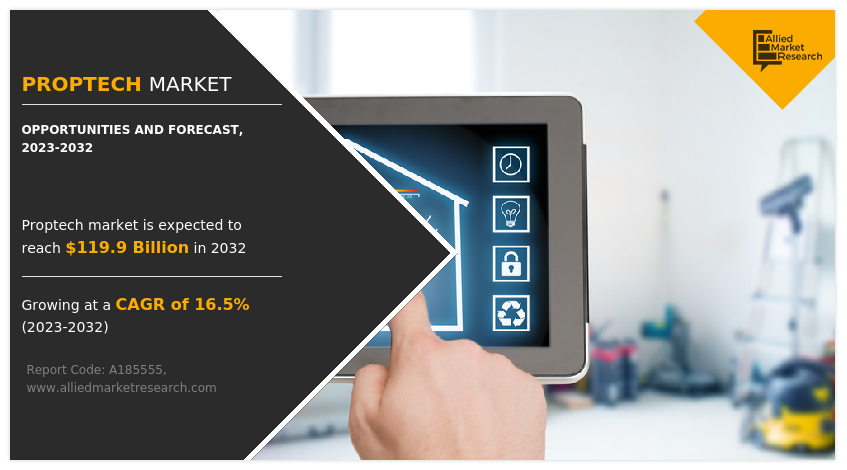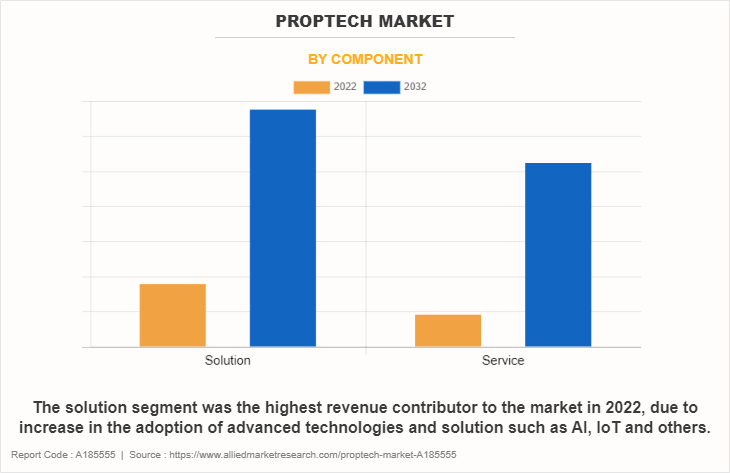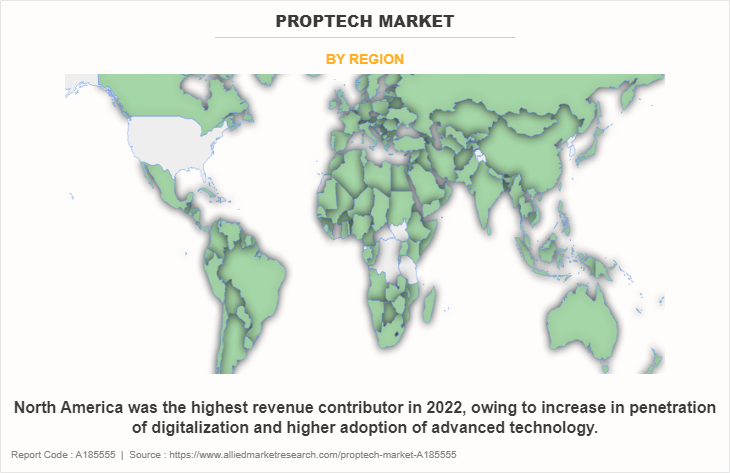PropTech Market Overview
The global proptech market was valued at USD 26.8 billion in 2022, and is projected to reach USD 119.9 billion by 2032, growing at a compound annual growth rate (CAGR) of 16.5% from 2023 to 2032.
Surge in adoption of digital technologies such as artificial intelligence (AI) and big data and digitally transformed in the real estate sector are expected to drive augment the growth of the market. In addition, growing demand for automation is expected to fuel the growth of the market during the forecast period. Furthermore, expansion of proptech solution in the industrial and commercial sectors is expected to provide lucrative growth opportunities for the market in the upcoming years. Moreover, increase in investment in IoT (Internet of Things) and smart building is also anticipated to create lucrative opportunities for the market growth. However, slower adoption of technology in the real estate industry and traditional mindset for property related processes, hamper the proptech market growth.

Introduction
Property technology is the intersection of the real estate industry with technology, software, and digital solutions that are intended to maximize the sale-purchase, research, marketing, and management of properties. With the help of advanced technologies such as artificial intelligence (AI), data analytics, IoT and blockchain, property technology market are reshaping various aspects of the real estate businesses. These innovations’ goal is to enhance efficiency, transparency, and user experiences in property-related task.
Furthermore, with increasing urbanization and digitization in every sphere of life and industry, technology is the central driving force in improving overall well-being and driving key economic metrics globally for property technology market. Rapid adoption of technology has also created lucrative opportunities for disrupting traditional industries such as real estate sector that is primed for technological disruptions and digital transformations. Moreover, as technology continues to advance, the proptech market is expected to enhance further, providing new and exciting possibilities for both real estate enterprises and consumers alike.
Segment Review
The proptech market is segmented into component, deployment mode, type, end user, and region. By component, it is bifurcated into solution and service. By deployment mode, it is divided into on-premise and cloud learning. By property type, it is categorized into residential property and commercial. On the basis of end user, the market is classified into housing associations, property managers/ agents, property investors, and others. Region-wise, it is analyzed across North America, Europe, Asia-Pacific, and LAMEA.

On the basis of component, the global proptech market share was dominated by the solution segment in 2022 and is expected to maintain its dominance in the upcoming years. Increase in adoption of advanced technologies and solution such as AI, IoT and others are expected to propel the market growth. However, the service segment is expected to witness the highest growth, as proptech service help to reduce the time and costs associated with optimizing systems in the initial phase of deployment.

By region, North America dominated the proptech market size in 2022. Increase in investment in advanced technologies such as cloud-based services, AI, business analytics solutions, and IoT to improve businesses and the customer experience is anticipated to propel the growth of the market. However, Asia-Pacific is expected to exhibit the highest growth during the forecast period, owing to increase in penetration of digitalization and higher adoption of advanced technology.
Key Market Players
Key players in the global proptech market include Altus Group, Ascendix Technologies, Coadjute, Guesty, HoloBuilder, ManageCasa, Opendoor, Qualia, Zillow, and Zumper. They drive industry growth through strategies like business expansion, product launches, and partnerships.
Top Impacting Factors
Accelerated Adoption of Artificial Intelligence (AI) and Big Data
The real estate industry produces a vast quantity of data from a number of sources, including property listings, transaction histories, market trends, and consumer behaviour. Proptech businesses are now able to obtain, process, and integrate data more efficiently thanks to AI and big data technology, which enables them to gain insightful information and make informed decisions. Furthermore, AI systems are adept at absorbing massive datasets and detecting patterns and trends that human analysts could have overlooked. These predictive analytics skills have been used to forecast property values, occupancy rates, rental trends, and property investment prospects in the proptech industry. Moreover, proptech companies have used AI to provide personalized experiences to clients. This comprises personalized property recommendations based on individual tastes, budgets, and lifestyles, as well as customized marketing campaigns to potential buyers or renters.
In addition, the AI-powered automation has improved numerous real estate operations, decreasing manual burdens and enhancing efficiency. AI has been used to automate tasks such as property management, tenant screening, and lease agreement processing, saving both property owners and managers time and resources. Therefore, improved data collection and integration, enhanced predictive analytics, and personalized customer experience significantly increase digital ownership for the market.
Digital Transformation in Real Estate Industry
Proptech systems have automated and digitized numerous formerly manual real estate activities, such as property management, leasing, and tenant relations. This increased efficiency allows real estate professionals to focus on higher-value duties while providing a consistent experience for customers. Furthermore, the proptech solution has given rise to a variety of online real estate platforms via which buyers, sellers, and brokers may interact and deal digitally. These systems facilitate smooth communication, property listing, and transaction processes. Moreover, proptech platforms and apps provide property seekers with a streamlined and user-friendly experience. They match potential buyers or tenants with properties that match their interests using innovative search algorithms and AI-driven recommendations. Virtual tours, 3D visualization, and augmented reality (AR) can all help to improve the property viewing experience.
In addition, The Internet of Things (IoT) and smart sensor integration into buildings is made simpler by the proptech solution. In order to improve building management, boost energy efficiency, and improve tenant comfort, these sensors collect data on energy usage, occupancy trends, and environmental factors. Therefore, improved efficiency and automation, online property platforms, and property search and marketing drive the growth of digital transformation in real estate for the proptech market forecast.
COVID-19 Impact Analysis
COVID-19 pandemic had a significant impact on the proptech industry as social distancing measures drove the demand for virtual property tours, online property management tools, and digital contract signing platforms. In addition, finding, buying, selling, renting, and investing in property comes with the same complexities as any advanced industry and needs the right technology to enable its potential. Therefore, well-equipped proptech services during the pandemic helped modern real estate agencies respond to changing consumer expectations and market dynamics. Moreover, key players in the market adopted strategies such as acquisition, partnership, and collaboration to enhance their services in the market.
For instance, in September 2021, property technology provider, MRI Software, entered a binding scheme implementation deed and acquired 100% of Proptech Group Limited for an estimated value of $93.4 million. PTG is an operator and investor in real estate software companies, primarily in Australia, New Zealand, and the UK. Such developments helped the proptech market trends to grow during the pandemic period.
Furthermore, proptech platforms have evolved since the pandemic broke out as it helps the buyers track all the processes in a property-buying deal from the comfort of their homes. The real estate market place has been quick to identify opportunities in adoption of technology with various initiatives to stay competitive in the global proptech market.. For instance, in July 2023, London-based VC firm A/O launched $274.38 million fund for proptech start-ups based in London, which provides capital to start-ups that are aiming to accelerate energy transition and digitalization in real estate and construction. Such factors helped the market to grow during the pandemic period.
Key Benefits for Stakeholders
The study provides an in-depth proptech market analysis along with the current trends and future estimations to elucidate the imminent investment pockets.
Information about key drivers, restraints, and opportunities and their impact analysis on the proptech market size is provided in the report.
The Porter’s five forces analysis illustrates the potency of buyers and suppliers operating in the proptech industry.
The quantitative analysis of the global market for the period 2022–2032 is provided to determine the proptech market potential.
PropTech Market Report Highlights
| Aspects | Details |
| Market Size By 2032 | USD 119.9 billion |
| Growth Rate | CAGR of 16.5% |
| Forecast period | 2022 - 2032 |
| Report Pages | 267 |
| By Component |
|
| By Deployment Mode |
|
| By Type |
|
| By End-User |
|
| By Region |
|
| Key Market Players | Zumper Inc., Zillow, Inc. , HoloBuilder, Inc. , Altus Group, Opendoor Technologies, Inc., ManageCasa, Inc., Coadjute Limited, Ascendix Technologies, Guesty Inc., Qualia |
Analyst Review
The proptech industry represents a pivotal opportunity for real estate businesses to reimagine and elevate customer experience. By embracing advanced technology and digital solutions, businesses can unlock numerous advantages for their organizations. Proptech enables firms to simplify operations, enhance productivity, and allocate resources more effectively, which reduces costs in the long run. Additionally, organizations may better understand client preferences by utilizing data analytics and artificial intelligence (AI)-driven insights, enabling them to create personalized solutions and raise customer satisfaction. For instance, in September 2022, HDFC Capital and Invest India launched a PropTech platform “HDFC Real Estate Tech Innovators” to identify, recognize, and award disruptive innovations in the construction tech, sales-tech, fintech, and sustainability tech verticals. Development of new technologies within the real estate sector is expected to play a vital role in the creation of efficiencies and promote sustainability within the real estate development cycle.
In addition, property technology also facilitates better communication and engagement with clients, as businesses can implement user-friendly platforms, chatbots, and virtual tours, enabling potential buyers and tenants to interact with properties remotely. This level of accessibility and convenience can significantly enhance the customer experience and attract a broader audience. Moreover, integration of blockchain technology for secure transactions and property records provides trust and transparency, thus enhancing the credibility of the real estate brand, which is expected to provide the lucrative opportunities for the market growth during the forecast period.
Furthermore, businesses can utilize the proptech solution to drive sustainability initiatives and adopt green practices in their properties, aligning with the growing demand for environmentally friendly options. By implementing IoT devices and smart energy management systems, real estate companies can reduce their carbon footprint and appeal to environmentally conscious consumers. As a result, the proptech solution empowers businesses to innovate, adapt, and create a seamless customer experience that differentiates their brand in a competitive market. Embracing the proptech solution can lead to enhanced operational efficiency, better customer engagement, and a stronger position as a progressive and customer-centric organization within the real estate industry.
The global proptech market was valued at USD 26.8 billion in 2022, and is projected to reach USD 119.9 billion by 2032
The global PropTech market is projected to grow at a compound annual growth rate of 16.5% from 2023 to 2032 to reach USD 119.9 billion by 2032
Altus Group, Ascendix Technologies, Coadjute Limited, Guesty Inc., HoloBuilder, Inc., ManageCasa, Inc., Opendoor technologies, Inc., Qualia, Zillow, Inc. and Zumper Inc. are some of the top companies in the industry.
The North America is the largest market for the PropTech.
Surge in adoption of digital technologies such as artificial intelligence (AI) and big data and digitally transformed in the real estate sector are expected to drive augment the growth of the market.
Loading Table Of Content...
Loading Research Methodology...



